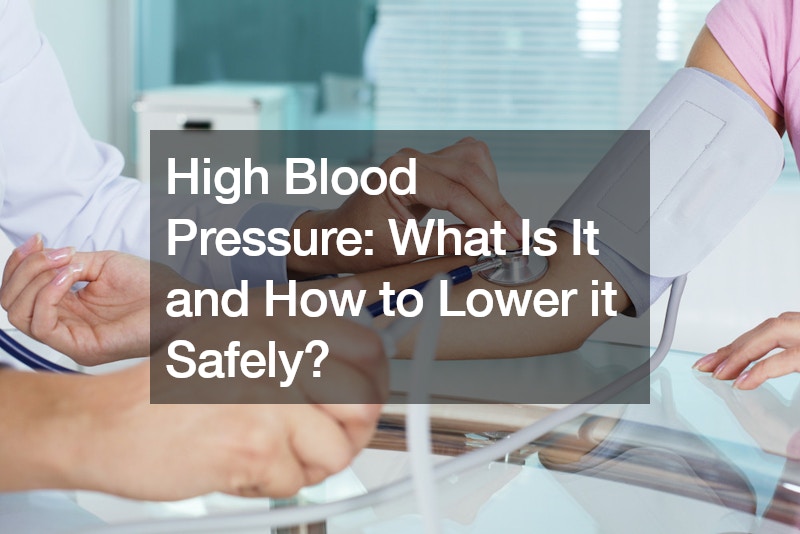High blood pressure, also known as hypertension, is a surprisingly common condition that affects millions of people worldwide. Often dubbed the “silent killer,” it frequently presents with no noticeable symptoms, making it a sneaky culprit behind many serious health problems. The good news? High blood pressure can be effectively controlled, and in many cases, prevented altogether through healthy lifestyle choices.
So, what exactly is blood pressure? Imagine your blood as water flowing through a complex network of pipes, your arteries and veins. Blood pressure is the force exerted by this flowing blood against the walls of these vessels.
It naturally rises and falls with each heartbeat. The highest pressure occurs when the heart contracts to pump blood (systole), while the lowest pressure happens when the heart relaxes between beats (diastole). Blood pressure readings are typically given in two numbers, separated by a slash. For example, 120/80 mmHg signifies a systolic pressure of 120 and a diastolic pressure of 80 millimeters of mercury (mmHg).
A healthy blood pressure reading generally falls within the range of 90-120 systolic and 60-80 diastolic mmHg. When blood pressure readings consistently exceed 140/90 mmHg, it’s classified as high blood pressure.
Why is High Blood Pressure Dangerous?
The reason high blood pressure is so concerning is because of its long-term effects on the cardiovascular system. Over time, persistently high blood pressure strains the blood vessels, causing tiny tears in their walls. These tears become breeding grounds for fatty deposits and blood clots, which can significantly narrow or even block the vessels. When this blockage occurs in the arteries supplying the brain, it can lead to a stroke. If it happens in the coronary arteries that nourish the heart, it can cause a heart attack. Similarly, blocked blood vessels in the kidneys can lead to kidney disease. Additionally, the heart has to work much harder to pump blood against the increased pressure, eventually leading to heart failure.
What Causes High Blood Pressure?
While the exact cause of high blood pressure often remains unknown (referred to as primary hypertension), several risk factors contribute to its development. These include:
- Age: As we age, our arteries naturally become less elastic and more prone to stiffening, leading to increased blood pressure.
- Diet: A diet high in processed foods, saturated fats, and added sodium can significantly elevate blood pressure. Conversely, a diet rich in fruits, vegetables, and whole grains is known to have a blood pressure-lowering effect.
- Smoking: Smoking damages the blood vessels and makes them more susceptible to narrowing, raising blood pressure.
- Alcohol Intake: Excessive alcohol consumption can contribute to high blood pressure.
- Weight: Carrying excess weight puts a strain on the heart and increases blood pressure.
- Physical Inactivity: A sedentary lifestyle is a known risk factor for high blood pressure. Regular exercise, on the other hand, helps keep blood pressure under control.
- Stress: Chronic stress can trigger the release of hormones that temporarily increase blood pressure.
- Ethnicity: Certain ethnicities, such as African Americans, have a higher risk of developing high blood pressure.
- Family History: Having a family history of high blood pressure increases your risk.
- Underlying Medical Conditions: Certain medical conditions, such as kidney disease, diabetes, and sleep apnea, can also contribute to high blood pressure.
How is High Blood Pressure Diagnosed?
The good news is that high blood pressure is a readily detectable condition. During a routine doctor’s visit, your blood pressure will be measured using a sphygmomanometer, which consists of an inflatable cuff wrapped around your upper arm and a stethoscope to listen to the blood flow. Your doctor will typically take several readings at different times during the appointment to get a more accurate picture.
If your blood pressure readings are consistently elevated, your doctor may recommend additional tests to assess your overall health and identify any potential underlying causes. These tests may include blood tests to check cholesterol levels, kidney function, and blood sugar levels, as well as an electrocardiogram (ECG) to assess your heart’s electrical activity.
Living With and Controlling High Blood Pressure
High blood pressure, a silent threat, requires ongoing management. Thankfully, numerous strategies can effectively lower it and improve your cardiovascular health.
Lifestyle Modifications: Embracing a healthy diet is crucial. The DASH (Dietary Approaches to Stop Hypertension) plan, rich in fruits, vegetables, whole grains, and lean protein, is a fantastic starting point. It naturally reduces sodium intake, a major culprit in high blood pressure. Maintaining a healthy weight further alleviates pressure on your heart.
Exercise is Your Ally: Aim for at least 150 minutes of moderate-intensity exercise or 75 minutes of vigorous exercise per week. Regular physical activity strengthens your heart, improves blood flow, and naturally lowers blood pressure.
Reduce Stress: Chronic stress can temporarily spike blood pressure. Explore relaxation techniques like deep breathing, meditation, or yoga to manage stress effectively.
Limit Salt and Alcohol: Restrict added sodium intake by opting for fresh ingredients and reading food labels carefully. Moderate alcohol consumption is key; excessive amounts can elevate blood pressure.
Medication Might Be Necessary: In some cases, medication is needed alongside lifestyle changes. Your doctor will determine the most suitable type of medication based on your specific needs and medical history.
Monitor Regularly: It’s vital to consistently monitor your blood pressure at home or during doctor visits. This allows for early detection of fluctuations and adjustments to your management plan if needed.
By adopting these strategies and working closely with your doctor, you can effectively control high blood pressure and live a long, healthy life. Remember, consistency is key. By making these changes a part of your daily routine, you’ll be well on your way to managing your blood pressure and protecting your heart health.
.


